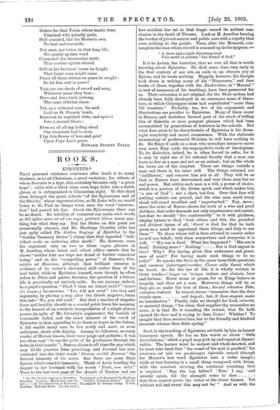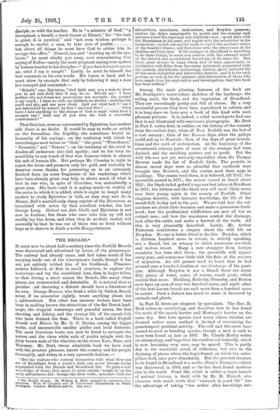BOOKS.
EPICTETUS.*
THAT personal existence continues after death is to many thinkers, as to all Christians, a great certainty; for others, of whom Socrates is a type, this certainty becomes only "a great hope"; while with a third class even hope fades into a feeble gleam or is extinguished in Cimmerian night. To this third class belonged the great schools "of the Epicureans and of the Stoicks," whose representatives, as St. Luke tells us, would listen to St. Paul no longer when once the word "resurrec- tion" had passed his lips. About the Epicureans there can be no doubt. No subtlety of comment can make such words as Nil igitur more est ad nos neque pertinet haulm mean any- thing but what they say. But the Stoics on this point are occasionally obscure, and Mr. Hastings Crossley (who has just aptly added The Golden Sayings of Epictetus to the "Golden Treasury Series ") claims that they regarded "indi- vidual souls as enduring after death." He, however, rests his argument only on two or three vague phrases in M. Aurelius, whose latest and ablest editor asserts that he shows "neither hint nor hope nor dread of further conscious being," and on the " compelling power " of Seneca's Con- solatio ad Marciam, although that brilliant exercise is evidence of its writer's rhetorical skill rather than of his real belief, while in Epictetus himself, even though he often refers to Plato and quotes Socrates, the question of a future life is practically set entirely aside. In one passage, indeed, to a pupil's question, " Shall I then no longer exist ?" (oiciTt
Aroical;) he answers, "You will not exist" (dm ioSi), and ingenuity, by placing a stop after the Greek negative, turns this into " No, you will exist." But that a teacher of singular force and lucidity should on a crucial point leave his meaning to the hazard of an eccentric interpretation of a single phrase passes (in spite of Mr. Crossley's arguments) the bounds of reasonable belief, and the exact interest of the creed of Epictetus is that, appealing to no fears or hopes in the future, it did enable many men to live nobly and meet, or even anticipate, death with dignity. Among its followers, as every reader of Horace knows, there were prigs and pedants ; it was too often easy " to see the pride of its professors through the holes in their mantle "; Seneca shows to all time the gap which may divide practice front preaching, and Juvenal has con- centrated into the thiee words "Stoieas occidit Baream." the fiercest intensity of his scorn. But there are some Stoic figures which ennoble humanity. Think of Arria handing the dagger to her husbands with the words "Paete, non. dolet." Turn to the last torn page of 'the Annals of Tacitus and see
• (1) The Golden Sayings of Epictetus. Translated and Arranged by Hastings Crossley. London: Macmillan and Co. "Golden Treasury Series." 12.s. 6.1. net.j—(2) The Discourses of Enicletus. Translated by George Long. 2 vols. London : Bell and Sons. Ps. net each.]
how accident has set to that tragic record its noblest con. elusion in the death of Thrasea. Look at M. Aurelius bearing the burden of private sorrow and public care with a royalty that owes nothing to the purple. Then, after the Monarch, con- template the man whose record is summed up in the epigram " A slave and cripple Epictetus trod This earth in penury—the friend of God."
It is to Arrian, the historian, that we owe all that is worth knowing about Epictetus. He died some time very early in the first century of our era, an exile in an obscure city of Epirus, and he wrote nothing. Happily, however, his disciple took down in writing many of his "Discourses," and four books of these, together with the Enchiridion, or " Manual " (a sort of summary of his teaching), have been preserved for us. Their substance is not original, for the Stoic system had already been fully developed in an enormous mass of litera- ture, to which Chrysippus alone had contributed " more than 705 treatises." Probably, too, few of his arguments and illustrations are peculiar to Epictetus. Many of them occur in Horace, and doubtless formed part of the stock of telling bits of dialectic or terse pungent phrases which had been accumulated by generations of lecturers in the schools. But what does seem to be characteristic of Epictetus is his down- right simplicity and moral earnestness. With the elaborate terminology of professorial Stoicism he will have nothing to do. He flings it aside as a man who nowadays means to move men must fling aside the sesquipedalia verba of theologians. To its dialectics, indeed, he is often forced to refer, for it is only by right use of his rational faculty that a man can learn to live as a man and not as an animal ; but on the whole his views are of the simplest. There are things outside a man and there is his inner self. The things external are " indifferent," and concern him not at all. They will be as God or Nature have determined, and over them man has no real power. But within each man is a will, a power of choice, which is a portion of the divine spirit, and which makes him "a son of God" ; not a slave, but free. Over that free will nothing outside can prevail, and the wise man amid every shock will stand steadfast and " unperturbed." Nay, more ; since the order of Nature shows the work of a wise and good Artificer, that order demands not only acquiescence and assent, but that we should "live conformably" to it with gladness, singing hymns to God, "both others and this, the grandest and divinest hymn of all, Great is God, for that he hath given us a mind to apprehend these things, and duly to use them." To those whose will is thus attuned to cosmic order no evil can befall; with them everywhere and everywise it is well. " His son is dead.' What has happened ? His son is dead.' Nothing more ? Nothing:. But is God unjust in this ? Why? For having given thee endurance and great- ness of soul ? For having made such things to be no evils ? " So speaks the Stoic in the queer terse little questions and answers (interrogatiunculae, Cicero calls them) which he loved. As for the law of life, it is wholly written in three words,—'Ayixor, 'A wizets, endure and abstain, bear and forbear. Never moan or groan, for so Kings behave in tragedy, and thou art a man. Moreover, things will be as they are, so make the best of them ; ducunt volentem Pala, nolentem trahunt. In utmost stress " remember that the door stands open and depart ; but, if thou stayest, make no lamentation." Finally, take no thought for food, raiment, or material things, " for when God supplies thy necessities no more, it is that He is sounding the retreat, that He hath opened the door and is saying to thee, Come! Whither ? To nought that thou needest fear, but to the friendly and kindred elements whence thou didst spring."
Such is the teaching of Epictetus, set forth by him in honest homespun speech. He has no fine words or clever " little dissertations," which a pupil may pick up and repeat at dinner- tables. The learner must be earnest and whole-hearted, and he must take heed that " the vessel of his soul is purified," for sincerum est nisi use quodcunque infundis acescit (though for Horace's last word Epictetus uses a ruder image) ; while at best learning is a small thing compared with doing, with the constant striving, the continual wrestling, that is required. " Has the boy fallen P Rise,' I say, and wrestle again, till thy strength come to thee that thou mayest prove the victor at the Great Games. Yet without toil and sweat this may not be." And as with the disciple, so with the teacher. He is "a minister of God," "a hierophant, a herald, a torch-bearer at Eleusis," for "the task is great, it is mystical," and "not even wisdom perhaps is enough to enable a man to take care of youths but above all things he must have God to advise him to occupy this office." Conceit, too, and " drawing up of the eye- brows " he must wholly put away, ever remembering that
saying of Rufus—surely the most pregnant saying ever spoken by human teacher to his disciples—" If you have leisure to praise me, what I say is naught." Lastly, he must be himself the best comment on his own words. His lesson is hard, and he must show by example that only by following it may a man live tranquil and contented :— " Behold," says Epictetus, "God hath sent you a man to show you in act and deed that it may be so. Behold me I have neither city nor house nor possessions nor servants : the ground is my couch ; I have no wife, no children, no shelter—nothing but earth and sky, and one poor cloak. And yet what lack I? am I
not untouched by sorrow, by fear ? am I not free ? when have I laid anything to the charge of God or man? when have I accused any ? hath any of you seen me with a sorrowful countenance ? "
That Stoicism, even as represented by Epictetus, has another
side there is no doubt. It would be easy to write an article on the formalism, the frigidity, the sometimes brutal in- humanity of his sayings ; on the confusion with which he interchanges such terms as " God," " the good," "Providence," " Necessity," and " Nature " ; on the tendency of his creed to deaden all endeavour into dull apathy ; and on his total in- sensibility to any touch of that wise humour which is almost the salt of human life. But perhaps Mr. Crossley is right to reject the dross and preserve only the gold, and certainly he deserves warm thanks for presenting us in an extremely finished form (as some fragments of his renderings which
have been already given may help to show) much of what is best in one who, in spite of blemishes, was undoubtedly a great man. His book—and it is saying much—is worthy of the series to which it is added, while it ought to tempt many readers to study Epictetus in bulk, as they may now do in Messrs. Bell's marvellously cheap reprint of the Discourses as translated with notes by that excellent scholar, the late George Long. Habent sua fata libelli, and Epictetus is not now in fashion; but those who once take him up will not readily lay him down, and when they do so their verdict will assuredly be that he was one of those who so lived without hope as to deserve in death a noble disappointment.







































 Previous page
Previous page